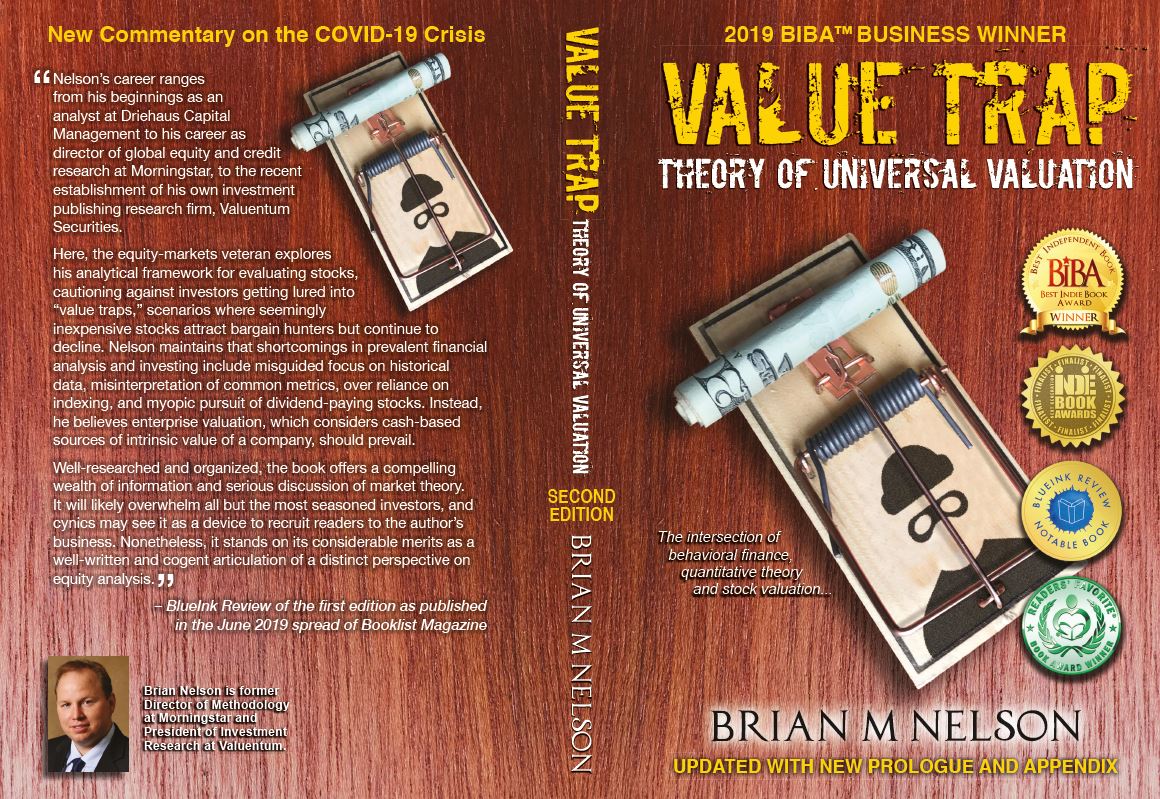The Difference Between Speculation and Investment

Brian Nelson, President of Investment Research at Valuentum, discusses the difference between speculation and investment.
Brian Nelson, CFA:
This is Brian Nelson from Valuentum Securities.
I’d like to talk about the concept of speculation. I think it is best taught with a story perhaps, one of my personal experiences. I used to work on the buy side and one of the more interesting stocks that I pitched in my experience was a company called Synaptics (SYNA). This must have been in 2004-2005 -- almost 20 years ago now.
Synaptics made an interface for a number of electronic devices, and what it held was some of the technological building blocks for a click-wheel technology. About a year or two later following that technology, it was adopted into something called the iPod at Apple (AAPL). You remember the first-generation iPod with the click wheel technology that was provided by a company called Synaptics ticker symbol SYNA.
Now, to some degree, the technology was fantastic, but on the other hand, prior to Apple including it in its widely-adopted consumer groundbreaking technology, there was only a loose connection between that technology ever being adopted by anyone. It was more or less a very low probability that Apple would embed that particular technology into its revolutionary product.
I remember this call very well. It was so good that a large portion of the office received iPods that year for Christmas gifts, but fast forward let’s say ten years later. A company called GT Advanced (GTATQ) was making sapphire crystal displays and was very much believed to be included in the iPhone 6.
Well, it turns out GT Advanced wasn’t, and the company ended up declaring bankruptcy in 2014, wiping out shareholders, despite building many facilities to accommodate potential growth with their sapphire technology. GT subsequently emerged from Chapter 11 in 2016, but not before equity interests were extinguished.
So, on one hand you had an unbelievable success story like Synaptics, and then on the other hand, you had a bankruptcy with GT Advanced. From the outside looking in, both seemed to have similar opportunities or potential, but one worked out and the other didn't. When you think about buying into nascent technologies and very unproven technologies, that’s speculation. Looking for things that may or may not be adopted or become part of our future is speculation.
Investing, on the other hand, is often much easier and more straightforward than speculation. Here's just a short list of extremely successful low-tech companies that became successful, despite not having what might be considered the latest and greatest new and groundbreaking technology:
A company like Netflix (NFLX) for example, they started mailing DVDs in traditional mail before moving to streaming. A company like Chipotle (CMG), they put healthy ingredients in a burrito. Companies like Dominoes (DPZ), they franchise pizza delivery. Amazon (AMZN) is but a warehouse company that allows consumers to order online, and when you go back into history, Walmart (WMT) is but a general store. Coca-Cola (KO) made carbonated beverages.
Unlike investors that are focused on fundamentals and future expected free cash flows, speculators could largely be setting themselves up for disappointment if a new technology doesn't hit it big--meaning if you’re getting a hot stock tip or you’re getting a penny stock idea that could be the "next great thing," that’s speculation. It’s akin to buying a lotto ticket. It’s likely not going to pay off. Even some of the well-researched ideas out there by some very reputable brokerage houses thought GT Advanced was going to be another Synaptics, but it just didn't pan out.
So investing should not be viewed as looking for the next big thing. Oftentimes, the next big thing just doesn't work out. Investing is understanding that opportunities can exist anywhere, in the most likely places, in the largest of stylistic areas, and in the strongest of companies. You don’t have to go to the exotic regions of the globe or to the most risky of technologies to find new ideas. That's speculation. You’re just taking on more risk when doing so.
For example, some investment opportunities during the past 10 years or so have been simple and straightforward. Microsoft (MSFT) was a layup. Apple was a layup. Though these entities have strong technologies themselves, their opportunities rested in an investor understanding their mispriced future expected free cash flow streams. The market was underestimating the size of their future expected free cash flows, and their success wasn't largely hit or miss like that of a speculative upstart.
What I'm trying to say is that to be a successful investor, you don’t necessarily need an exotic new idea every single day to buy a lotto ticket on. That’s not investing, that’s speculation. To remind yourself just how dangerous and unpredictable speculation can be, remember the story about GT Advanced and how it could have either went bankrupt or become the next 'Synaptics' the next time that you get told about another hot stock tip or a penny stock with a brand new exciting technology.
Sometimes the best investments are well-known and incredibly boring, while the most exciting, speculative stocks with new technologies may just turn into another lotto ticket that won't ever pay off. Thanks for joining Valuentum and take care!
----------
About the speaker: Brian Nelson is the president of equity research and ETF analysis at Valuentum Securities. Brian is frequently quoted in the media and has been a frequent guest on Nightly Business Report, Bloomberg TV, CNBC, and the MoneyShow. Prior to Valuentum, Mr. Nelson worked as a director at Morningstar, where he was responsible for training and methodology development within the firm's equity and credit research department. Brian led the charge in developing Morningstar's issuer credit ratings, developing and rolling-out one of the firm's proprietary credit metrics, the Cash Flow Cushion. Mr. Nelson is very experienced in valuing equities, developing Morningstar's discounted cash-flow model used to derive the fair value estimates for Morningstar’s entire equity coverage universe. Prior to that position, he served as a senior industrials securities analyst covering aerospace, airlines, construction, and environmental services companies. Before joining Morningstar in 2006, Mr. Nelson worked for a small capitalization fund covering a variety of sectors for an aggressive growth investment management firm in Chicago. Brian worked on a small cap fund and a micro-cap fund that were ranked within the top 10th percentile and top 1st percentile within the Small Cap Lipper Growth Universe, respectively, in 2005. Mr. Nelson holds an MBA from the University of Chicago Booth School of Business and also has the Chartered Financial Analyst (CFA) designation. Brian can be reached at brian@valuentum.com.
----------

This article is an edited transcript of a video recorded October 12, 2014. Tickerized for various top holdings in the ARKK.
Brian Nelson owns shares in SPY, SCHG, QQQ, DIA, VOT, BITO, RSP, and IWM. Valuentum owns SPY, SCHG, QQQ, VOO, and DIA. Brian Nelson's household owns shares in HON, DIS, HAS, NKE, DIA, and RSP. Some of the securities written about in this article may be included in Valuentum's simulated newsletter portfolios. Contact Valuentum for more information about its editorial policies.
Valuentum members have access to our 16-page stock reports, Valuentum Buying Index ratings, Dividend Cushion ratios, fair value estimates and ranges, dividend reports and more. Not a member? Subscribe today. The first 14 days are free.